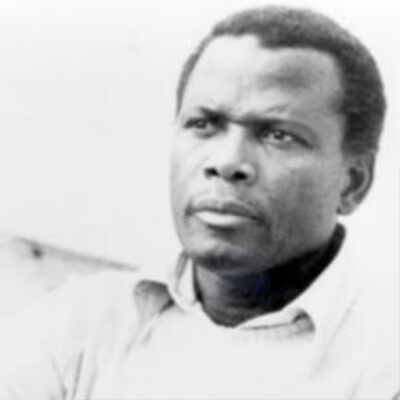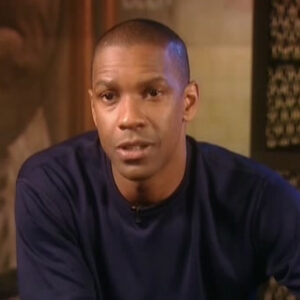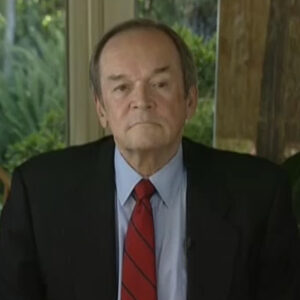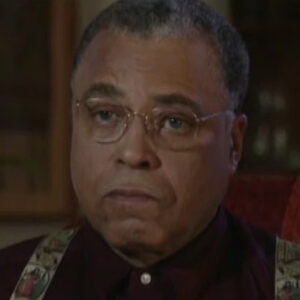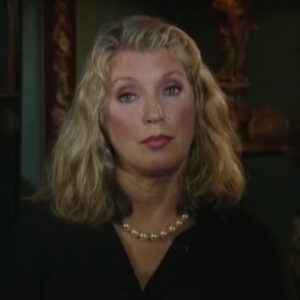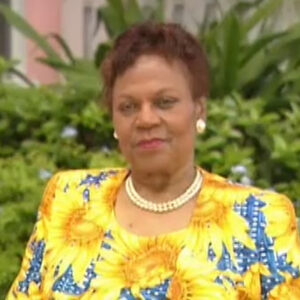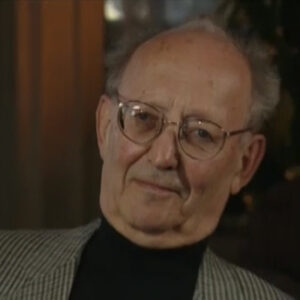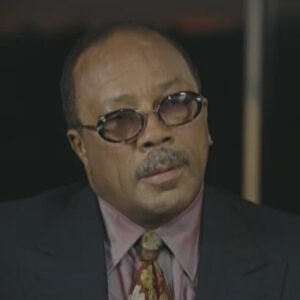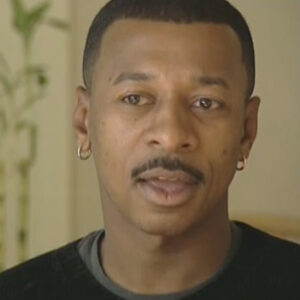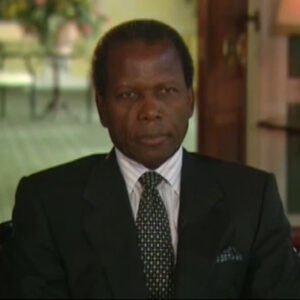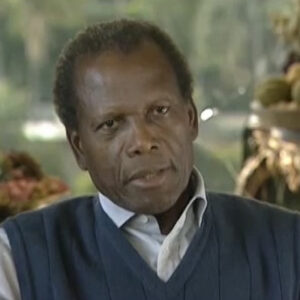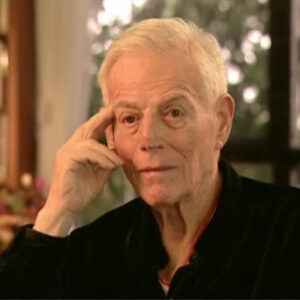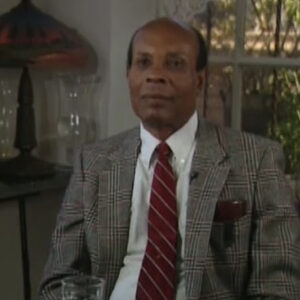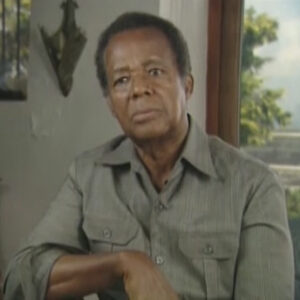Speaker Who you are in relation to Sidney, you go first.
Speaker Well, the.
Speaker Grand sons of his aunt, his grandmother and his father were brother and sister, so year, so his father and my father know his father and my father were first cousins, first cousins.
Speaker No, no, no, no. He didn’t have my first cousins and my father, first cousins and I, we’ve gotten that straight.
Speaker So your second cousins were first cousins? No, no. His father and my father, first cousins. We are second cousins to the farm, I guess, and his children.
Speaker He ended up in the mountains, you know, like that.
Speaker You know, your family, you know, say and that’s the way it works. And all those divisions and and all the hierarchy goes out the window because we knew each other on a closer basis.
Speaker And if that’s true, that’s one thing I’ve always been, you know, their cousins and their cousins, you know, their cousins on paper and cousins, I guess in practice, certainly he’s always been a presence in our lives from the very beginning.
Speaker We’re going to have to keep quiet. I can’t talk.
Speaker Tell me about what you were doing in the States at the time of when you went to college?
Speaker At the time of the height of Sydney’s. What were you both doing in the States?
Speaker Well, we were studying, I guess, and discovering ourselves, discovering ourselves, I guess primarily as artist, but studying in a very academic environment, studying various subjects, trying to understand whether we were going to follow our fathers in some medical field or whether we would follow our own dreams. And I guess the thing that stands out in in my mind and is that we we were both advised by Sydney to do exactly what we wanted to do because the rewards are always so much greater. And that was very special because for a whole lot of our contemporaries, they were following dreams of other people.
Speaker I think it was very grounding to have somebody around who not only followed his own dream, but actually achieved that, which a lot of people, in fact, most people at the time thought was absolutely impossible.
Speaker Absolutely impossible. What year were you there, what years were you there?
Speaker Well, they were there from 1963 to I left in 1979 because I went all the way through graduate school and marriage, a first marriage. And, you know, this is really a much longer story than just the college years. But I would like to endorse what Jackson said about the the whole experience. You know, it was an experience that we were very grateful for with Sydney because we were both sort of directed into an academic environment to go into a certain kind of profession, maybe to follow our father into dentistry or related medical field.
Speaker And Sydney sort of legitimized what our real desires were as artists.
Speaker And he gave us permission to just be, you know, and I can remember exactly the first time I heard Sidney say that, do exactly what you want to do. The rewards are greater. You know, I thought he only said it to me. But now I understand that. I guess he said it all of us. And what that did was that really gave me permission to be exactly what I wanted to be, and that was to be an artist.
Speaker So it was a great time to talk about Sidney’s journey, of course, to me, especially coming here and seeing where he was born and Cat Island and having worked with Sydney.
Speaker To me, it’s Dickensian. It’s behind me and Dickensian story.
Speaker What do you think of Sidney’s career?
Speaker Well, I think Sydney is really a miracle when you think about it. You know, I was telling one of your colleagues here that I thought his track was equivalent to Columbus’s track. I mean, it was almost an impossible kind of dream to find out if the world was really round, you know, to go at such a young age to New York. But I think Sydney is intelligence and his ability to really continue to be such a disciplined human being sort of protected him against all of the other dangers that probably would have forced someone else to succumb to them.
Speaker And I think that that really is his strength.
Speaker And it’s you know, it’s just amazing to know that this man is our family.
Speaker And we watched him grow and develop and really perform the miracle that he has on the world. You know, he really and a lot of ways makes our family as proud as he makes the rest of the world.
Speaker You know, I think it’s particularly special is that he was tangible, wasn’t a fantasy of of marketing, and he was somebody that we knew first as a human being who is really a very humble, very shy kind of person, who was available like any other family first.
Speaker And then we saw him on the screen and all those other things. But he endorsed for us. The stars already said the sense that anything is possible.
Speaker Because I don’t get the impression that he knows the word impossibility and he may not challenge.
Speaker And so he’s prepared to discipline himself to work hard. And that was a tremendous role model for us, for us. He was somebody we could touch and we could call on and we could talk to. And it was amazing because we took it for granted.
Speaker And schoolmates thought, really, it’s on, the landlady said we had a relationship with Sidney Poitier. We could pick up the phone and call Sidney Poitier.
Speaker I remember one one time when we were undergraduates, Sidney showed up on the college campus where we worked and nobody believed that he would actually come.
Speaker We said we could be true. And no one no one believed that the president didn’t show up.
Speaker The dean didn’t show up.
Speaker Everybody thought the little girl pulling your leg and embarrass the school, you know. And when he showed up, the president comes running over and the dean comes in behind because they had gotten the word that Sidney Poitier had actually showed up on the campus. And that was very real. And it wasn’t something that Sidney, I appreciated or I don’t even think I really appreciated at that time, the effort that he must have taken just to simply satisfy his family and and any number of stories like that where he just was for his family. And then he was this famous guy.
Speaker I think that I mean, just if I might just add on to what he said, you know, I think the one thing that really stands out about that period is that he was at the height of his popularity and yet he remained available to us. He has never ceased being Uncle Sidney, you know, and it used to amaze me. I think he was number one at the box office. And I’m walking down the street with him, just like I would normally do before he became number one at the box office. And everybody is, you know, the cause bumping into each other because they’re looking at him. And, you know, he you know, there’s so much adulation, but he has remained the same. He has done some incredible things to show his love for his family members. I mean, most recently, I mean, he surprised me here at my exhibition and he hosted an exhibition for us in Atlanta, Georgia, during the Olympics. I mean, he had to fly in by private jet because there were no flights. But he constantly has done very, very generous things just out of his love for us as family members.
Speaker Let’s talk about your local papers that just put the lights in my nose.
Speaker Right.
Speaker I got experience with one of three California girls.
Speaker Yeah, it just doesn’t have as much glare. OK. Feels like Gary right to talk about the views of Sydney and Paul Robeson.
Speaker That was the Blackhearts presentation at Penn.
Speaker Yeah, yeah, this was a slide presentation by Donald Bogle at the University of to back up.
Speaker I want to that I want to go into a period earlier, OK?
Speaker My feeling and I spoke to Sydney about it today, was that there is something about being raised in a Bahamian society where you are surrounded by 90 percent black people and where you have a sense of your own entitlement and your pride as against the blacks who are raised in the United States who don’t have that.
Speaker And certainly from Cat Island, where he has never known any racism and all that.
Speaker I do do do do feel that his curiosity and his wonderment in himself and the world.
Speaker Made him very free in front of the camera and able to carry that kind of dignity and that kind of pride.
Speaker With me, I do concur.
Speaker Let’s talk about this. I’d like to speak on that. I don’t think there’s any question.
Speaker That somebody growing up at a time he did in Canada with the the parents he grew up with, who were essentially farmers, who did for themselves, who fed themselves and provided for themselves and were totally free, worked for themselves and produced the way they did. I don’t think there’s any doubt that that is what grounded him in his ability to be very secure and very confident and to have a level of dignity and a sense of his own humanity that was very different from persons who grew up in an environment that denied them. And I believe also that he had a sense that he could do whatever he wanted to do simply because he he only knew that things certain things were challenging and hard work could overcome them. He never knew any artificial barriers beyond the physical challenge of finding resources to do what you have to do.
Speaker And and so he made them very different and very misunderstood and in America, because he never had a sense that he he had to hate, but he never had a sense that he had to be less than so that others could feel comfortable.
Speaker And he never displayed that.
Speaker And that was very foreign to most.
Speaker African-Americans at the time, you know, they would say to us, you’ve got to get in trouble because you get up on the bus and you give the seat to a woman or you’re walking down the street and you say hello to a white man on the street. I mean, this is in the 60s. So you get something in trouble. Why do you do that? And I said, well, where I come from, you speak to everybody. Woman Come on the bus, you give them a seat. And it wasn’t until years later that I understood why they were so concerned about that, because of their circumstances. But someone like Sidney coming out of Carolyn when he did, he would not have experienced any of that. And and he just simply expressed himself and and he didn’t have that same kind of fear.
Speaker He was raised with fear.
Speaker No, it was not, you know, true. None of you, Kathy.
Speaker I guess not.
Speaker You know, I you know, I definitely agree with everything that Jackson said.
Speaker I think it’s a it’s a sense of independence more than anything that you can make your own way and you can create your own reality that allows you the courage to really make decisions to your own benefit.
Speaker I think the way it relates to Sydney is that to a great extent, I think he controlled his career rather than his career, controlling him to let the of.
Speaker It was whispered. And obviously saw those photos as well.
Speaker Now, what you need to do is call some pretty lady and talk to a lot going is going on about, oh, that’s the beginning of that conversation.
Speaker That’s what I’m going to say.
Speaker If he gets on the phone and talks to some ladies in 16 or. OK, I understand some.
Speaker I do feel I think that that Sydney.
Speaker I did some work that was so extraordinary that, you know, it’s breathtaking edge of the city, Raisin in the Sun when he was a young man and expressed his frustration and his rage.
Speaker Excuse me one moment. She knows me. You have to be absolutely quiet. Would you turn the TV off, please? You have to be absolutely quiet, OK?
Speaker We apologize for it.
Speaker So. Oh, it’s hard.
Speaker It’s hard because they’ve been very good. Yeah. Yeah.
Speaker Can you see water running out of my eyes? You know, I have a tent, OK? No, but you want to clean this thing for us.
Speaker But but but I talk about his his gift, his town, I’m sure, when you saw him.
Speaker It was astonishing to you, too.
Speaker Oh, yeah, I think the first time I can remember seeing him is in The Defiant Ones. I think that was the first movie of his that they brought here. The first one was the first one we saw.
Speaker And, you know, all of a sudden I see him on the big screen, you know, because in those days in the Bahamas, going to the movies on Saturday, that was it. You know, I mean, that was the only entertainment that we had as kids so that we saw Alan Ladd and and Robert Mitchum and Wendy Murphy, Eddie Murphy and all those guys, you know, a lot of cowboy movies. But, you know, and we idolized those movie stars in those days, you know, all of them, Randolph Scott and, you know, John Wayne and at all. And to go into that same movie theater where we idolize those movie stars who were somehow just so fantastic and unreal and of another world.
Speaker And to see Sidney on that screen, you know, I mean, it just blew our minds, you know. And, you know, I can only say that it seemed like a miracle, you know, and to see how comfortable he was, you know, and how he was able to to be as convincing as as anybody, you know, as Audie Murphy has already.
Speaker All right.
Speaker But in you know, in those days, I think that really was a memory that we will always cherish.
Speaker You know, I mean, that that was the an achievement that, you know, we couldn’t begin to describe to see him in that place. You know, also, it wasn’t just your Uncle Sidney.
Speaker It was a handsome black.
Speaker A man who was a leading man, he was making history, he was making history.
Speaker I think it I think in the bigger picture, he was a major inspiration for this country.
Speaker And I think at that time, not only were we inspired, but everybody of our generation and in fact, everybody of his generation was inspired because got to remember, I mean, clearly, you know, that he what he was doing was was pushing the envelope further out and nobody in the Bahamas ever expected him to succeed.
Speaker It was something that wasn’t supposed to be done. It was a crazy idea to even think that he could be a movie star in the first place or an actor or an actor.
Speaker And it was a tremendous inspiration for for all of us. And I think the inspiration goes beyond his profession. I think the inspiration and I keep saying that his inspiration was.
Speaker Inspiring us to be back better than we thought we might be.
Speaker And inspiring us to be excellent at whatever field we chose at a period where there were no black leading man.
Speaker None, none, none.
Speaker Why Sydney, from when did he start being the leading man in no way out, no way out to 1968 when I was, as you say?
Speaker I think it was that year that he was first, second and third at the box office competing with himself at the box. And he was the only one.
Speaker Incredible. Why?
Speaker You know, what’s your answer? Well, I think, first of all, it’s his talent, you know, just raw talent.
Speaker Sydney is just to me, having gone beyond the Audie Murphy Randolph Scott stage and really starting to study cinema, you know, and look at actors in a more critical and analytical way. You know, you just recognised that Sydney was able to convey so much, not just with his voice, with his expression, but especially with his body language. I think Sydney has an incredible way of moving that. It’s just so dynamic, you know, and you see him in real life, you know, and he almost tripped over the stoop when he was here and he just sort of did a dance and everybody was like that, you know. You know, he was just a natural. And I think that all of that helped to create such a powerful charisma that he was able to express on the screen. And it was just so dynamic that I don’t think they had any choice but to use him, you know? So I think, first of all, it was his talent more than anything.
Speaker I agree with everything you say that answers that no, I, I think just remember there were other talented black actors and had.
Speaker No, I don’t think you see, I don’t think Sidney success at that time had anything to do with his being black. It may have had something to do.
Speaker At the level of marketing, what he did.
Speaker But I think he was very conscious that he needed to work hard to be first and foremost excellent and the best at his craft period just happen to be a black man being excellent and at the top of his craft.
Speaker And he did it at a time when America was hungry to see a symbol of success in the black race.
Speaker And so those two circumstances came together to propel him to the top.
Speaker But we can’t ever forget that it wasn’t because he was black, that he was at the top.
Speaker He was at the top because he was just so damn good at what he did and where the folks responded to that intellectually or they responded to that emotionally. They couldn’t deny him his place.
Speaker Now, being black helped is a good looking black man.
Speaker And that helped, but folks who didn’t like black folks love Sidney Poitier and made excuses for the fact that he’s a black man. Sidney Poitier, I don’t like [Unrecognized], but.
Speaker But that’s Sidney Poitier, you know, and and good. It’s not saying that about Michael Jordan. That’s true. Same kind of thing. And magic the.
Speaker Same kind of thing, and I just I just think that for us, as we look back on it, as we are growing in our own craft and our own careers, we recognize in his discipline, his diligence and his his commitment to be excellent and to push himself to the top.
Speaker And is is what made him assume the position that he did.
Speaker Do you think going back to what we were talking about earlier, that that by Bahamian self-confidence?
Speaker Permitted him to do things fearlessly. Oh, no question. Absolutely no question about it.
Speaker Tell me. Well.
Speaker There just so many things that you.
Speaker Don’t have to think about, you know, we have a different kind of mythology, I imagine that, you know, you maybe have no culture, etc, etc., but we can have the mythology that we ever felt that we were less than we saw images of success and leadership in our own community.
Speaker And so it wasn’t artificial for us to think that we can do. Whatever we decided we wanted to do. We knew it was going to take a lot of hard work and and young bohemians who achieve even nowadays feel that the only real barrier is their ability to to work hard and to focus on what they want to do.
Speaker And I’m sure that that helped Sydney a lot.
Speaker I think so, too, I I think that was the secret factor that nobody ever realizes. I think so.
Speaker And I think that was the family influence as well.
Speaker You know, the Poitier family, the tradition of the way he was raised, you know, the way he was molded as a human being.
Speaker You know, we all have that like my father was able to convince us that there was absolutely nobody in this universe that was better than we were. Of course, he convinced us also that we weren’t better than anybody else in the universe.
Speaker And that allows us to think big and to think without restriction.
Speaker And I think he had that when you were in the States and you went to college with African-American African-Americans.
Speaker Did you sense a difference between you and they in terms of their having a heel on their neck and some kind of psychic way?
Speaker I’d like to answer that one here, because I stayed in the U.S. a little bit longer than Jackson did. And there was a point just before I returned to the Bahamas when I had been living in the U.S. for so long that I started to think like an African-American.
Speaker And I started to notice that if I would walk into a store, the body language would all of a sudden start to react to my presence, you know, and this was something that I never noticed when I first went to the U.S. and my mindset didn’t allow me to even consider the possibility that someone would react to me just based on my color. But, of course, I was able to to see that and not allow that to affect my psyche. But it made me understand that the African-American who is so defensive and reacts almost before his hit, you know, he’s ducking, you know you know, that really is the reality that he faces every day.
Speaker And it’s unfortunately a reality that denies him a lot of opportunities that he possibly could get.
Speaker You know, I think it’s important to say that sometimes with good reason, there’s a sense of a victim in the African-American experience in the north, particularly, I find that the folks in the South were, in spite of the fact that there was more overt racism in the south. I found that the folks of black folks in the south, particularly those who grew up in rural environments, were very much like we were, because with with with less resources, they had a sense of a values of human values that made them very rich in their culture. And you see them in the music you see in the yard and you see the dance and sense of self assuredness that that that we we had if we remember, we we come from very humble beginnings as well.
Speaker And the sense of. Victim in the urban landscape is justifiable, and oftentimes the sense of rage and the and the reaction, which is oftentimes eight, is understandable in an environment that is so quick to judge you simply because of the color of your skin.
Speaker And I certainly don’t think that while we understand that we we would feel that we should be separated from the tie and the bond of being African in the new world.
Speaker And then there’s another aspect to it, too. I think the African sort of measures his success based on a measurement that has nothing to do with with himself. You know, it’s an outside measurement, whereas a Bahamian coming up from Sydney’s tradition felt a certain amount of self esteem just based on his own ability to feel good about himself. You know, he didn’t need to be validated by an outside source, you know, so that he could feel rich just with the knowledge that he had the courage to be what he wanted to be. He might not have a job. He might not have money. He might not have anything. But he is totally independent. He has a sense of total control over his own life. And therefore, he’s a king, you know, but most African-Americans, I think, sort of measured their own self esteem based on a measurement that had absolutely nothing to do with with them. A white measurement, I think a weight measurement.
Speaker And I think it’s almost a system that was created around the ghetto, for example, that sort of didn’t allow certain people to think that they could get out of the ghetto, you know, because in other words, if you’re born in a certain place, you’re going to die there.
Speaker And all of the environment is telling you that you are not going to get out of there.
Speaker And, you know, Sydney didn’t have you know, Sydney had the ability to think that within his own abilities and within his own courage, he had the ability to make a life for himself.
Speaker You know, you see, I think is fundamental to recognise. That he had family. And that is very important.
Speaker He may you may not see family members for months, for years, and when you get together, it’s as if no time has passed. And that’s a that’s qualitative. It’s not something you quantify like how many Cadillacs you have and how many thousand dollar suits you have.
Speaker And if you depend on those material acquisitions to to validate you, then you have a very shallow and a very empty experience.
Speaker And I think that’s what I’m hearing.
Speaker You know, stand put his finger on that for a lot of our friends in the African-American and in fact, in the European community in America, there’s just so much concentration on the material.
Speaker And so much removal from the experience of the love of a large family that allows you to feel something a whole lot richer so that you would have you could have bare feet and no shirt on your back.
Speaker But you knew that there was somebody who cared and that strengthened you.
Speaker And just the sense that that there were people who loved you, gave you the ability to step out to the world and say this may not, you know, accept me as I am and I am the best and being me and feel really comfortable saying that I don’t have a long car, I don’t have a big house, I don’t have a dollar in my pocket, but I have a sense of who I am and I’m going to be the best at being me and nobody’s going to compete with that.
Speaker Now, if you want to try to be me, don’t be second best. I only try to be you. And that is what I think you saw.
Speaker And Sidney Poitier, in those days when he was one, two and three in the box office, he was being Sidney Poitier and he knew that as long as he was expressing himself, nobody was going to touch him.
Speaker Nobody.
Speaker And that’s the that’s the message.
Speaker That’s that’s the power that I think that’s grounded in and in the knowledge that that no matter what happened to the conditions, that he would return to the kind of love and the kind of the faith and the kind of support that he could return to, I mean, here here with his family could rejuvenate his batteries and his people and allow him to go beyond this family and family is bigger in your mind if our family is all around everybody. I mean, he had everybody in the street in the Bahamas feel ownership of Sidney Poitier.
Speaker And Sidney Poitier belongs not just to those whose line connects to Poitier. Belongs to all, Ali. All of us. And that’s.
Speaker Sure is there.
Speaker There came a time, and I think it was when you were in school, when somebody wrote what was the name of the man, Clifford Mason wrote an utterly hideous article about Sidney.
Speaker I think the title that the Times gave him was Why Do Why Why Does White America Love Sidney Poitier?
Speaker And it hurt him, it hurt him just terribly.
Speaker And it tore apart his pictures, particularly, I guess, who’s coming to dinner.
Speaker Why do you think there was that turning and you were in the States at that time, what was the feeling among.
Speaker Blacks in your school, African-Americans in the school about that kind of criticism.
Speaker Well, there was a period when black power was a novel idea, and we as young people just embraced all of the proponents of that philosophy from Stokely Carmichael, Rap Brown at all.
Speaker And it was during this period that I think Martin Luther King sort of, I wouldn’t say fell out of favor. But young people had a different way of looking at Dr. King and had a different way of looking at Sydney, because I grew up the both of them together.
Speaker They had a similar philosophy and approach to life, you know, and I think that it hurt me to hear some of the comments from some young people about both Dr King and Sydney, because they didn’t know him, because anyone who meets Sydney gets a sense of how much integrity he has as a human being and how much pride he has as an African man, if you will. And I think it’s the sense of pride that he has in himself that has allowed him to achieve what he has achieved, you know, because he hasn’t mimicked anybody.
Speaker You know, he has done it his way.
Speaker And I think I was very hurt by some of the comments. But the amazing thing about that period was that while you heard that kind of thing happening, if Dr.
Speaker King appeared anywhere, you know, everyone would go crazy and show how much they loved him. And it was the same thing with Sydney. You know, I don’t think anyone was able to resist his charm and his charisma in those days.
Speaker I think he probably felt the brunt of a lot of unnecessary comments that really I don’t think were.
Speaker Well, the result of any real research, you know, because if they really got to understand Sydney and got to speak to him, they would understand that, you know, those comments were totally inaccurate. So I think during that period, I I was very, very hurt by some of the comments that were made against Sydney.
Speaker Well, what did what did the Black Power Watch, which everybody was was excited about, it was like the quick fix.
Speaker We’re tired of waiting. It was the quick fix. And it was like, screw you.
Speaker You know, we’ve waited long enough and and we’re on the move now. And it was militant.
Speaker Of.
Speaker What was it about that?
Speaker That was. Fresh and important.
Speaker To you and yet became impatient with whatever icons had been there, I think I think the whole movement challenged the.
Speaker Defining of. The reality, as we grew up to know, is we grew up in a colonial environment that said the queen was some lady across the water. You know, fortunately for Stan and myself, we had a father who said the queen was in our house.
Speaker And it was that was that made us very special. As we as we get older, we recognize that we are able to think with a level of freedom that mean the queen was at our house.
Speaker You know, Mother, how could you have.
Speaker The adoration for somebody as a queen who is defined by someone else’s reality is being superior to your mother. How could there be anyone above your mother?
Speaker So the defiance was already there, but there was a level of anxiety during the period of the black power movement, certainly from my perspective, that said that we had to get to a point where we could redefine the icons and we could re-establish images of dignity that relate it to us.
Speaker And this was urgent.
Speaker And it still is urgent for us as a people. It’s urgent for the world really to to challenge the obvious in that kind of way. But unfortunately, like many things in in America, the substance wasn’t always what we focused on.
Speaker It was a superficial the hairstyles and the clothing, oftentimes the language and the louder the better.
Speaker And it was at that superficial level that Sydney’s performance out there by himself, really. He was really exposed on the world stage and he stood out on the edge of the world stage by himself redefining for the world the image of a black man.
Speaker And I think that redefinition of of is self.
Speaker Was frightening to folks, white and black, because it forced them to challenge a lot of the mythology that that they’ve become very comfortable with and in his ability to to to to cause us to question it brought on a lot of fear.
Speaker And I feel that as a result of that, folks wanted to attack because it’s very powerful. And here’s a man saying that the reality is that if a black man decides to do exactly what he wants to and he puts in the energy, he has the ability to overcome all those challenges, all that resistance and to stand at the top of the moral.
Speaker And think about it, and I think also the black power movement, I think came as a reaction to the way the Freedom March activists were treated, the way Dr. King’s people were treated when they marched nonviolently.
Speaker And all of a sudden there was there were these leaders who were saying, we’re not going to allow anyone to hit us and be not hit back. So people sort of responded because a lot of people were hurt. A lot of people were beat up. And because they were following Dr. King, they couldn’t hit back. So I think just out of self-defense, that was very attractive to a large number of blacks. And I think that Sydney received some of the negative from this movement because Sydney’s whole approach was associated with Dr. King. You know, his approach was one of non-violence and one of totally embracing or reaching out towards the white community. And I think a lot of the proponents of black power had been so devastated physically and emotionally by how they were treated when they marched nonviolently, that this was the reaction and Sydney just was caught up in the fallout. You know, we tend to forget the Sydney march with Dr King and Sydney and Harry Belafonte were very strong backers of what Dr. King stood for. So I guess it was only natural that when Dr. King sort of got some criticism from this new movement that Sydney would also receive some of the fallout from that criticism.
Speaker And then, of course, Dr. King was killed. Dr King was killed and became a hero.
Speaker And Sydney wasn’t killed?
Speaker No, I think it’s I think most people don’t know the depth of Sydney Borgia.
Speaker And the level of courage and the backbone of this man and oftentimes his judge, because he may not have stood out on the stage and call folks or whatever, whatever, in a very violent way, he is misjudged and misunderstood.
Speaker But here was a man who had the same level of rage, but the discipline to control it and to continue to achieve and recognized very early in the game that his performance.
Speaker At his craft and his excellence would be as powerful as any speech that he might have made out there or any violent act that he might have conducted.
Speaker Well, don’t you think that that just the fact of his being there made an enormous difference? Oh, absolutely. And white America.
Speaker Yeah. I don’t think there could have been a Michael Jordan without Sydney having paved the way.
Speaker You know, we’re talking about the total crossover acceptance of everybody, you know, accepting him as the greatest actor, you know, the box office leader. And we have the same thing with Michael Jordan. And I think that total acceptance, all of the endorsement contracts that he has are totally as a result of America not having to start from scratch to accept a black leader at the top of his profession like that.
Speaker And that’s because the Sudanese contribution you are talking about ropes and and and Sydney. And there were pictures being shown at the college that you were at. What were some of the comments? Tell me first about the Robson’s Sydney situation and what were some of the comments that you heard?
Speaker Well, it was a black arts festival, and Donald Bhogle was conducting a slide presentation of blacks in film. And he talked about Robeson and his contributions and how he suffered as a result of, you know, the Sudanese stance that he took and how he was blackballed and how he just sort of was totally destroyed. And then on the screen with Sidney on the back of Rock Hudson, I don’t remember the movie. It was taken from him, but he was riding on the back of Rock Hudson and everybody broke out laughing, you know, because I think Sydney at that time was perceived in a totally different way.
Speaker You know, it was almost like they were seeing him as so facile with his craft, you know, that he totally was triumphant over the the movie industry and was totally in charge.
Speaker And I think to a great extent, Sidney was criticized probably because he didn’t suffer like Robeson suffered.
Speaker You know, most people saw his success as having come easy to him, you know, and they didn’t really see him as really having the same kind of persecution that Robertson suffered. And as a result of that, I don’t think they forgave him for that. You know, and so there’s that difference, I think, in the way people, at least at that particular presentation, viewed Sydney as predominantly white audience. So it was sort of half and half. It was the University of Pennsylvania audience, 50 percent.
Speaker It was mixed.
Speaker Yeah, yeah. That picture would have been so early. And I wonder if that was one of his earliest movies. Yeah, I would wonder why they would put it in there in the first place. I mean, why wouldn’t why wouldn’t they put in my name is Mr Tibbs instead of.
Speaker I think that was only one that was the first shot of the Sydney shots.
Speaker You know, they had quite a few shots of his work, but that was the first time he got on the screen, you know, and that was the first reaction to him, you know, did any of the other students say things that you heard and what were they about that particular show about Sidney in general, when they when they, you know, when when the Black Power movement came?
Speaker Well, I think, you know, we talked a little bit earlier about some of the comments that were made about Sidney having really embraced Martin Luther King’s philosophy and, you know, Sidney being an integrationist and sort of reaching out towards the white community. And this was something that was not popular among this group of people who were blackpoll proponents, and I think I think to a great extent, Sydney’s success also created some of the criticism. You know, if if he had not been as successful as he was, probably there wouldn’t have been as much criticism. I think a great deal had to do with that. Do you think they were jealous?
Speaker I think a lot of it is jealousy, of course. Absolutely. A lot of it is jealousy.
Speaker I think, like a lot of people would probably be jealous of Michael Jordan, you know, I’ve heard a lot of comments, negative comments about Michael Jordan. Now, I don’t know Michael Jordan. And I guess the analogy seems appropriate because who knows what kind of contribution Michael Jordan makes to the development of African-Americans. Who knows? You know, we might find out that he doesn’t want to announce that he gives millions of dollars to this program and the United Negro College Fund and so forth. But because he doesn’t announce it, you know, he’s receiving a lot of criticism. And the criticism is really based on the fact that he is so successful that they can’t stand the fact that he is more visible in his support of the black community. But I tell you one thing, as an artist and as a father, I look on Sydney’s greatest contribution as being there for me to be able to point at him and say to my kids, you know, there he is. I don’t have to say anything else. Just look at him. And I think that’s an incredible gift that he’s given to the world.
Speaker What what was Morningside Heights?
Speaker Is that the play? Yeah, Carryback, come on inside and tell me about that.
Speaker You saw it? Yeah, I saw it in Philadelphia.
Speaker It had a very short run, probably nineteen sixty nine, I believe. Nineteen sixty eight versus Cicely Tyson and Cicely Tyson.
Speaker Paul Winfield is the story of a young, upwardly mobile black couple who move into Morningside Heights because they want to say that they’re there in or near enough to Harlem.
Speaker They’re comfortable being there to Harlem, but they are in a part of of of New York that also allows them to live a lifestyle which is relatively new.
Speaker And they hire young Columbia students who I believe were Jewish in the play, and they hire them as their servants.
Speaker I remember all the details of the play, but there was a reversal of roles and it questioned the sort of standard thinking at the time of blacks and whites and Jews, etc. in America. It challenged the whole racism perception. And and it was it was approved by the critics in Philadelphia. I just never got anywhere.
Speaker I actually was there the night that they played their very last performance.
Speaker And I remember we were going to a concert and we were we were dressed up in an African garb and they were I was with half a dozen other close friends of mine, all African-Americans.
Speaker And and we go to the stage door and we say we would like to see Sidney Poitier. And he said, well, I’m sorry, but, you know, he’s busy now. And and I say, but he is my uncle.
Speaker And they said, yeah, right. And Abraham Lincoln is my uncle, you know, go away from here, very busy.
Speaker And I said, would you say to Mr. Poitier, the Jackson boy, and say, this is over here? And so you’re serious. And I said, yes, I am.
Speaker And he went in and he said to Sidney, whatever he said. And he came back and he said, Oh, I’m so sorry I missed you. Says that you can come in into the theater and I find you some seats and you can watch the play. And when the play is over, you come out and talk to you. So make a long story short. We went in, we sat down and watched the play and we watch it. And they were. Maybe two dozen people in the entire theater have lived with the Shubert on Broad Street. I don’t remember which theater it was. It was one of those Philadelphia theaters.
Speaker And when everybody had to come out of the theater, the lights went out the after they’d done the curtain call and they they drew the curtains open.
Speaker And then Sidney was on the stage telling a young woman, Bloomfield and the rest of the cast that I was in. They had the reviews were were scathing. And Amarcord, well, particularly Philadelphia at that time, was not prepared to deal with the kinds of questions it was raising. It was just it just made them so very uncomfortable. And I believe at that point, you know, Sidney was thinking that he would go back to the stage because whether it’s true or not, I believe he really had a love for the stage. And that’s when he started, of course.
Speaker And he wanted to return to the stage and return to New York as a triumphant director and that. The hopes of just dashed, nobody was coming out because of the reviews. What did you think of the plan?
Speaker Oh, hey, I love the whole idea of the reversal of roles. I thought that it was great.
Speaker But weren’t any black folks in the in the theater from the 63 to starting from the 63 to 1979, I lived and went to school in Philadelphia, first at Lincoln University, Pennsylvania, then the Pennsylvania Academy of Fine Arts, then the University of Pennsylvania, and then living and working in the city of Philadelphia until 1979 and.
Speaker You, Lincoln, you went to Lincoln University in 1965 following Stone to go and discover American girls.
Speaker Well, don’t put that in the paper because that’s what it’s all about.
Speaker That’s what college was all. That’s that’s that’s all I thought it would doing the truth. But truth be told. That’s what I thought it was about.
Speaker And in 1965, I went to University of Pennsylvania in 1969. And between 69 and 74, I’ve lived and worked in Philadelphia. I left Philadelphia in seventy four.
Speaker Did the things that we’re talking about, did Sydney ever, ever discuss them with you?
Speaker Yeah. Yeah. Put your glasses down.
Speaker OK, what, what, what, what were the circumstances. And spoke to you.
Speaker Well.
Speaker He is a keen observer of politics and and he really has an extremely sensitive feel for his for his people, his family and for for us as a people. And he was very concerned about the kinds of things that were happening in America, particularly the riots. You know, I remember talking about the way we as a people destroyed our own environments in expressing outrage. And he thought it was so sad that our discipline was such that we understood that we ought not to be the target of our rage and that we ought to find more appropriate ways of demonstrating the way we felt and reacting to and and and building our future for our children.
Speaker When you go in and you destroy your own homes and you destroy the shops and the businesses and the commercial activity in your own neighborhood, you destroy the economy of your neighborhood.
Speaker And, you know, Sydney was very aware that news was sensitive to that kind of thing, and it really upset him.
Speaker And he could see no absolutely no reason. And oftentimes folks misunderstood when he said that to others. And he would certainly be talking very, very deeply because he could share with us things he couldn’t say publicly.
Speaker He would you know, he would find us find by telephone. He would meet him wherever he was. It wasn’t very often.
Speaker But when when we got to talk, we want to know what was happening, what was happening with the politics.
Speaker What what were the students saying? What were your friends saying?
Speaker How do you how are you feeling about about friends being shot in the back on the streets of Newark? We actually had that experience.
Speaker How how do you feel about what was obviously the worst human race and the waste of resources and the basic material?
Speaker Achievement of of of our people, because we were.
Speaker Justifiably angry, but reacting inappropriately, and that really hurt him in a lot of ways, and in the end, he always talked about it.
Speaker And just a short comment, one of the conversations that I have had with him at the time that really stands out my memory is when he was talking about the importance of family and how, you know, there was so much in the way of young girls getting pregnant and young men not living up to their responsibility. And he sort of started to talk about that because there was a friend of his, a very, very well known entertainer who sort of just abandoned his family, you know, and he thought that that was the greatest crime that a man could commit, you know, and he was obviously very hurt. And I remember thinking at the time that he was sharing something very personal, because I remember him saying that, you know, you know, he has to live up to his responsibility. You know, if you have children and they’re a part of a separation or divorce, you still have a responsibility to make sure that they’re properly cared for. You know, and there was a sense in Sydney at the time that he saw that responsibility that you had to children as being key to survival, especially of the African-American community. And, you know, I think he was very you know, that was really coming from his heart, you know, because to him, I feel family is more important than anything else. You know, I think as much as he loves his craft, as much as he loves the world. I think he really, really values his family. And as Jackson said earlier, I mean, that’s where his power comes from, you know, and you look at some of the individuals in our family, I’m amazed, you know, they’re so powerful, you know, and the women are so, you know, we call them biggity in the Bahamas, you know, big remans, you know, just totally confident and unafraid.
Speaker You know, they and and the men are biggity as well, you know? And it’s that, Paula, you know, when Sydney was number one at the box office and he came home, you know, they would rake him over the coals the same way they did all of his life, you know, and he loved it.
Speaker And, you know, that family love, I think, is really you can’t separate Sydney from his total surrender to the idea of family.
Speaker Yeah. You know. Yeah.
Speaker And how prophetic he was about families breaking up and teenage kids getting pregnant and the whole fabric of family breaking up and leaving broken human beings.
Speaker And the impact of that, you know, and how many years from now we’ll still feel the impact of, you know, young men without any sort of supervision and direction.
Speaker And, you know, I think.
Speaker I think really it’s it’s a message for the entire world, you know, that, you know, the whole world thought of itself as a family, then, you know, we would all be have that same kind of Sydney energy, you know.
Speaker Yes, Pam was was talking about on Cat Island of of children being taken in by other fact that where there is a need.
Speaker Children are just automatically taken into a family.
Speaker And some people say things like that, but they never do things like that in the state.
Speaker Yeah. Yeah. It’s automatic in front of a camera.
Speaker And nobody thinks that that’s not the right thing to do. It’s just a very natural thing to do when to embrace a child who needs to be taken in the palace neighborhood.
Speaker Arabella, Stobbs, Dibella OSPI in the mid 80s, and she’s raising a three year old, a great granddaughter and encouragement. And she doesn’t see anything unusual about that. She just sees that as being something that she ought to be doing in. And she is a woman who goes in her farm totally free every morning and she turns to feel and she brings huge baskets of goods back from the field on a head, balancing on the head and walk into the streets.
Speaker And and and in the meantime, she’s raising a three year old. And I typically in America, someone like her would have given up. And I’ve already moved into a home if she had the good fortune to be alive.
Speaker That’s the kind of background Cindy comes from.
Speaker And those lessons and those values have stuck with us all. You know, we oftentimes don’t don’t remember to be conscious about them, but they’re they’re they’re they’re they’re those images of strength and those images of dignity and and real power that comes from the ability to say who you are without question by anybody else. And that that feeling of. So self-assured innocence is his, that is.

